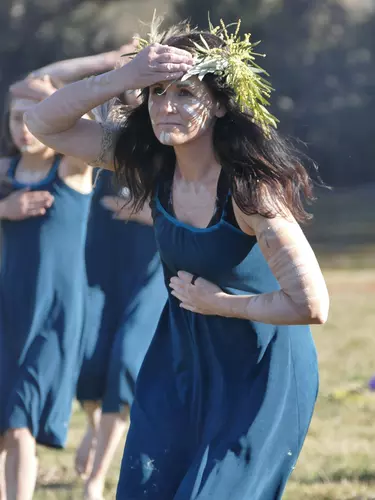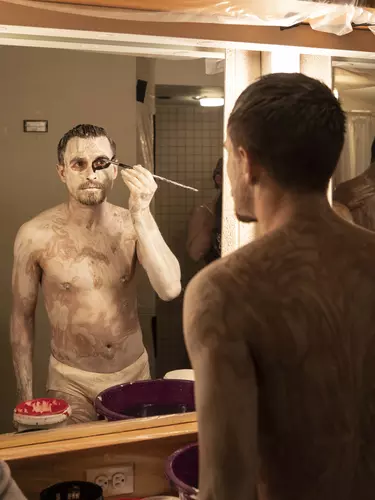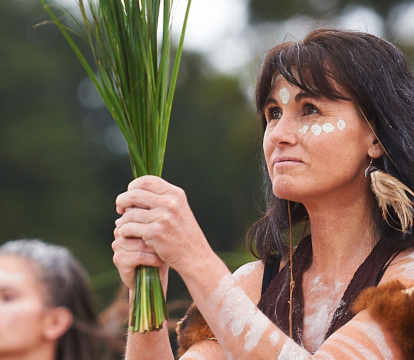Why NAIDOC matters
“Always Was, Always Will Be”
This year’s NAIDOC week falls four months later than usual – but what’s four months in 67,000+ years? The theme, ‘Always Was, Always Will Be’, is a rallying cry and a reminder: of generations of brilliance, of thousands of years of storytelling, and of Nations and cultures that cover this land. We ask some of our Opera House family – performers and artists who take centre stage during this week of celebration – to discuss this year's theme and to unpack why NAIDOC matters to them.
DOBBY
What does “Always Was, Always Will Be” mean to you?
“Always Was, Always Will Be” is not only a reminder for all of us to acknowledge and respect that these lands were never ceded; it’s a sign of immense pride for our ongoing physical and spiritual connections with these lands. This is something everyone can (should!) be proud of. But to get there, it’s gonna take a lot of education on your part! Learn the names of the lands you stand on, the local history, the local Elders, five words from that language, specific cultural sites to respectfully be aware of, and only THEN will you understand the meaning of the words “Always Was, Always Will Be”.
What is the significance of performing as part of NAIDOC week?
It is always an honour to perform as part of our annual NAIDOC celebrations, a week of Blak excellence across the fields. In any other year we would be celebrating this together, but for now we have each other online. For those that need to read this, write down the names of the artists you see during NAIDOC, and book them for something outside of NAIDOC.
‘Always Was, Always Will Be’ is not only a reminder for all of us to acknowledge and respect that these lands were never ceded; it’s a sign of immense pride for our ongoing physical and spiritual connections with these lands.
Jo Clancy - Wagana (Dance Rites 2020)
What does “Always Was Always Will Be” mean to you?
“Always Was, Always Will Be” means Durrurbuwulin Yindyamarra. We have cared for Ngurambang (Country) Durrurbuwulin (always) and we have an obligation to continue this with Yindyamarra – respect, honour, gentleness, politeness and humility.

Baden Hitchcock - Bangarra Dance Theatre
My name is Baden Hitchcock and I am a Bangarra dancer. My family comes from Saibai Island, the top western region of the Torres Straits as well as from Mabaduan and Hanuabada in the central and western provinces of Papua New Guinea.
What does “Always Was, Always Will Be” mean to you?
The Songlines that run through our Country are grounded in respect and custodianship of land and water. This cultural knowledge and understanding has been passed down over thousands of generations. Whether I am surrounded by concrete buildings in the city or under the shade of the canopy in the forest, I am always on Country. The only way to move towards a sustainable and rich future is to embrace these ideas of custodianship and respect the thriving rich cultural tapestry of Australia. As I think of ‘Always Was, Always Will Be’ it makes me think of the paths my ancestors carved so that I can be where and who I am today, learning and sharing about culture.

Jack Hickey, Mindy Kwanten, Mitchell Kwanten - Bow and Arrow
Jack is a Gamilaraay man, Mitchell’s mob is from Yackandandah and Mindy is a Wiradjuri Songwoman
What does “Always Was, Always Will Be” mean to you?
We think “Always Was, Always Will Be” is a strong statement that when spoken, brings empowerment and connection. Through all the destruction and continual cultural genocide that the First Nations people of Australia still endure everyday, this statement reminds us, no matter what has been stolen or destroyed, one's connection with the land is the most important thing. And that is something nobody can take away from us. Look after the land and the land will look after you.
What is the significance of performing as part of NAIDOC week?
To perform during NAIDOC is the biggest buzz! It's such an honour and celebration wrapped up in one. We affectionately call NAIDOC 'Black Christmas' because it's just such a wonderful week where everyone gets together and has a platform to be heard and everyone is supported. It's important for us to come together and share.

We affectionately call NAIDOC ‘Black Christmas’ because it’s just such a wonderful week where everyone gets together and has a platform to be heard and everyone is supported.
